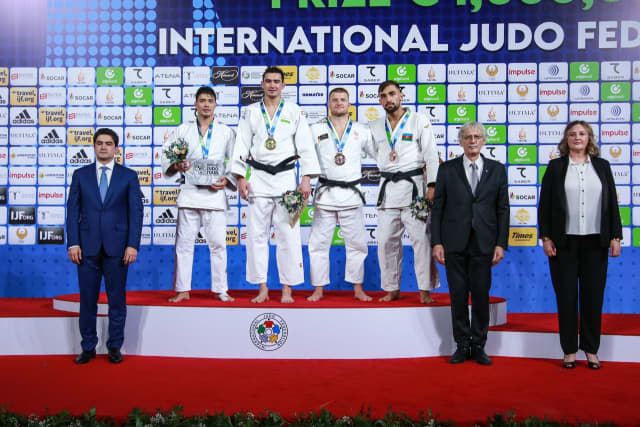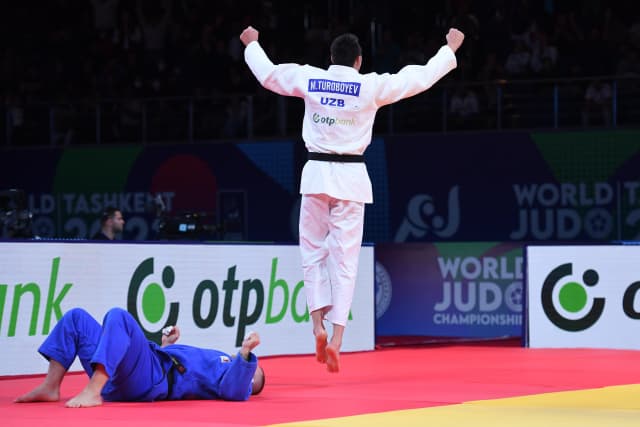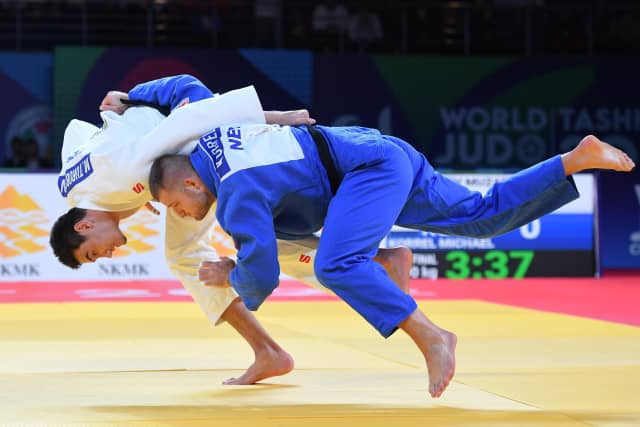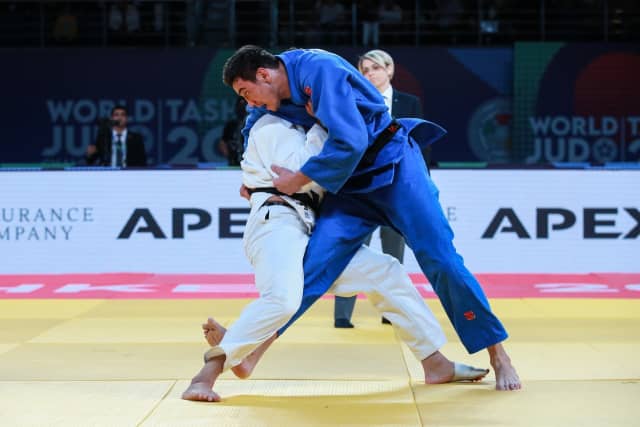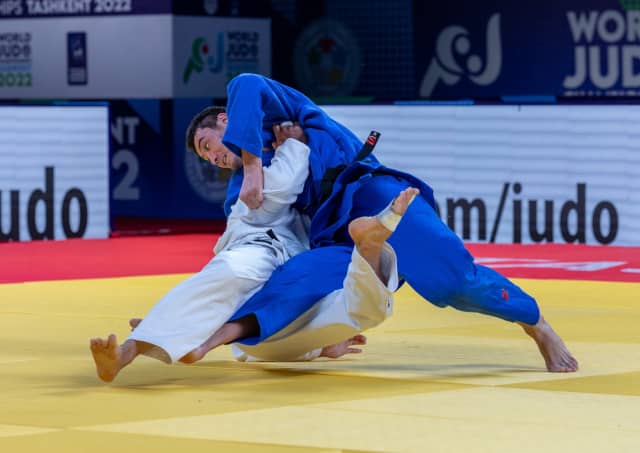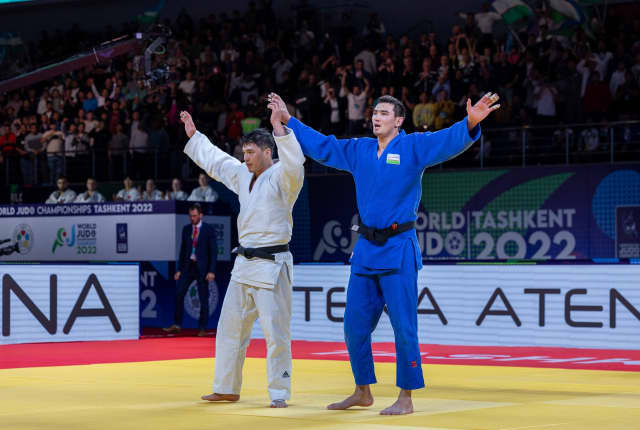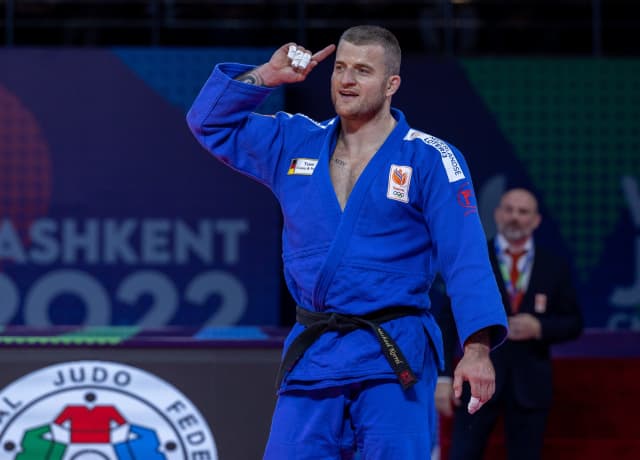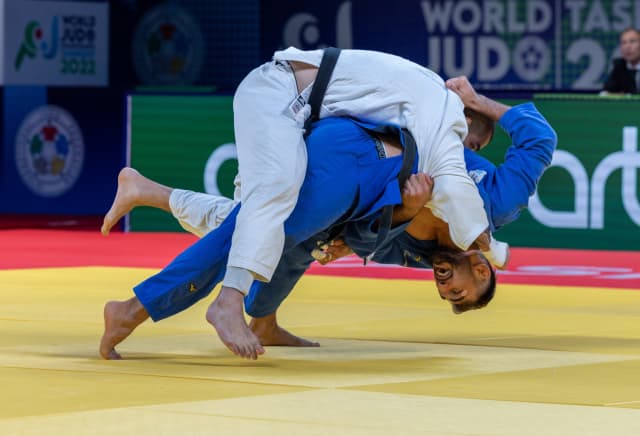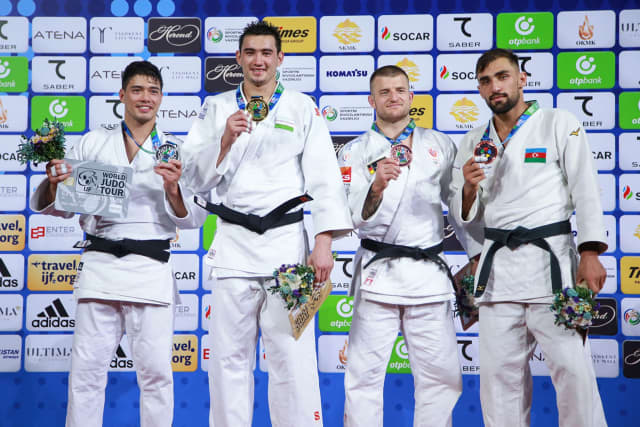The Japanese in question is Iida Kentaro, and his executioner is called Bojan Dosen, from the Serbian school. This was the first anecdote, the unprecedented and unexpected event. What followed was a series of explosive pairings at the bottom of the table, in groups C and D. The Canadian Elnahas had an appointment with the Spaniard Sherazadishvili, whose best friend, the Georgian Liparteliani, had to dance with the Uzbek Turoboyev, who arrived at the stadium highly motivated after Bobonov's gold the day before. The Dutchman Korrel met the Brazilian Buzacarini and for the Belgian Nikiforov fate gave him four minutes of fighting with the young Hungarian who has been pushing hard, Zsombor Veg. Ultimately, it was as if the school teacher had decided to pair up the best of each class for an exam between themselves and may the best one win. On that side, there was no problem; the public enjoyed it to the full, as they have done for almost a week, because it is true that we are seeing some amazing throws. There are more things to say because the Japanese was not the only disappointment among the big shots. The Israeli Paltchik fell against the Mongolian Batkhuyag, closing a negative cycle full of defeats ahead of time, compared to what was expected of him. There are seasons like this in which nothing goes well or maybe he has to train in another way or fight in a different way, we don't know for sure and he probably doesn't either, but time will bring him the answer.
In group A we focused on Jorge Fonseca because he was the first seed, double world champion, a concrete wall that takes your breath away when he gives you a hug and above all because he is a man of great appointments. He gives the impression that he is only able to produce his best judo when the situation is critical, when he has the greatest possible challenge ahead of him. The Portuguese got rid of Dosen in two minutes with a house brand ippon. It was his way of telling the rest that Tashkent must count on him. However, this was just the calm before the storm and the storm that came swept away any vestige of the past, any hint of favouritism. Fonseca got down on one knee in front of the magnificent Azerbaijani Zelym Kotsoiev, who had been under the radar for a while, no doubt preparing his regicide. Fonseca's loss of the crown was like a signal to others, something like ‘anything goes here, there are no rules,’ pure anarchy. There were people who understood the message, others are still trying to decipher it. Take for example the Canadian Kyle Reyes, 29 years old and in 31st place in the ranking, and at this level, in a world championship, it's like coming out of the catacombs. Reyes, with a waza-ari against him, joined the chaos theory and destroyed the Georgian hopes, who had two representatives and both went to the showers early. The first was Ilia Sulamanidze, who was devastated by Hurricane Reyes. The second was the legendary Varlam Liparteliani, who was literally crushed by the impetuous Turoboyev, 22 years old and 27th in the rankings, who advanced by ippon to the delight of the spectators. Another surprise, not because of the result but because of the form, was the farewell of the Spanish Sherazadishvili, who left through the back door, opened by the Canadian Elnahas. The Spanish coach was furious because his judoka did not go out to kill, to win, for the medal. Sherazadishvili likes to mark ippon with beautiful gestures but in this tournament there are other ways to do it and what matters is the result. It is even more curious because we are talking about a two-time world champion. The only representative from the cast of favourites to weather the storm was Michael Korrel. The Dutchman went into the basement, locked it and came out when the worst was over. He eliminated the Brazilian Buzacarini and the Belgian Nikiforov and stepped into the semi-final against Turoboyev.
Take note of the name, Muzaffarbek Turoboyev, tall as a sequoia, with more of a swimmer's body than a judoka's, but technically skilled and indecipherable to his opponents. His weak point is physical resistance but he makes up for it with fast and fluid movements. The Uzbek drove Korrel crazy, who had better stay in his basement. Reaching the final, the sequoia metamorphosed into a colossus of Rhodes or of Tashkent, but a colossus.
Let's be honest and we say it with all due respect, but who would have bet on a semi-final between Kotsoiev and Reyes? Not us, we confess it and we are happy for both of them and for the public because they offered a great show that concluded with an osae-komi from Reyes that propelled him to the final battle. Also, who would have bet on a final between Reyes and Turoboyev? We do know that answer and it bears two names, those of coaches Antoine Valois-Fortier and Ilias Iliadis, who did know that their boys were in monstrous shape. Coffee break, bathroom and we're ready for the final block and in case it will be the same as the preliminaries, we had better buy an umbrella and a float.
Before the final, we asked Valois Fortier how to fight a man like Turoboyev. The Canadian smiles, but answers, “He's a complicated judoka, with very long arms but he's a little weak physically. I think he will try to score very early. I've told Reyes to keep his distance and hold on. I think Reyes has the weapons to take down the Uzbek.”
It is 5:53pm in Tashkent, the stadium is full, there are flags and a contagious collective delirium. The combat promises and Reyes has a strange body language, as if the environment could be too much for him but it is only an impression. What he did do was follow his coach's instructions and stay out of Turoboyev's mile-long arms. The plan was to exhaust the Uzbek and the Uzbek's plan was to score ippon before his forces left him. It's the beauty of judo, seeing who of the two imposes his strategy. At 5:56pm Turoboyev was already puffing and wasting time during mate. At 5:57pm Reyes attacked and a minute later he knocked Turoboyev down. Then the Canadian's body language was radiant, powerful, conquering. A second shido came for Turoboyev and a nervous audience, very nervous, because they saw fragility in the Uzbek, who was gasping for air through his mouth, like a fish out of water. At 6:00pm golden score arrived and the Uzbek was behind. If Shakespeare had been here, we are sure he would have written something along the lines of ‘my kingdom for an ippon,’ but he wasn't. At 6:02pm Turoboyev fooled Reyes with a sudden move, as if he wasn't so tired and scored waza-ari. It was over, Reyes should have won because he was better but he didn't finish and the Uzbek didn't let the victory train pass. At 6:15pm Turoboyev, the colossus of Tashkent, received the gold medal that made him the new world champion.
Korrel was looking for a second bronze medal for the Netherlands and Sulamanidze a fourth medal for Georgia. The more intelligent was Korrel because he was clearly being dominated, but Sulamanidze made the same mistake as in the quarter-finals, letting the Dutchman score and letting time tick away. It was more of a poor performance from the Georgian than a brilliant fight from the Dutchman, but that's also how you can win.
Nikiforov vs. Kotsoiev was like walking into a dark room without knowing where the exit door is and with no way to find the light switch. They had met five times, with three wins for the Azerbaijani and two for the Belgian, but Kotsoiev’s level in Tashkent was even better, so we didn't know which way the wind would blow. Nikiforov tried but it was the Azeri who responded earning a waza-ari. As the seconds passed, we understood that Kotsoiev had the measure of the Belgian, knowing his weak points, what he likes and what he doesn't like. In any case, it was a perfect example of how to prepare a fight with the coaches. It was a second bronze for Azerbaijan and great frustration for Nikiforov.
Final (-100 kg)
Bronze Medal Fights (-100 kg)
Final Results (-100 kg)
